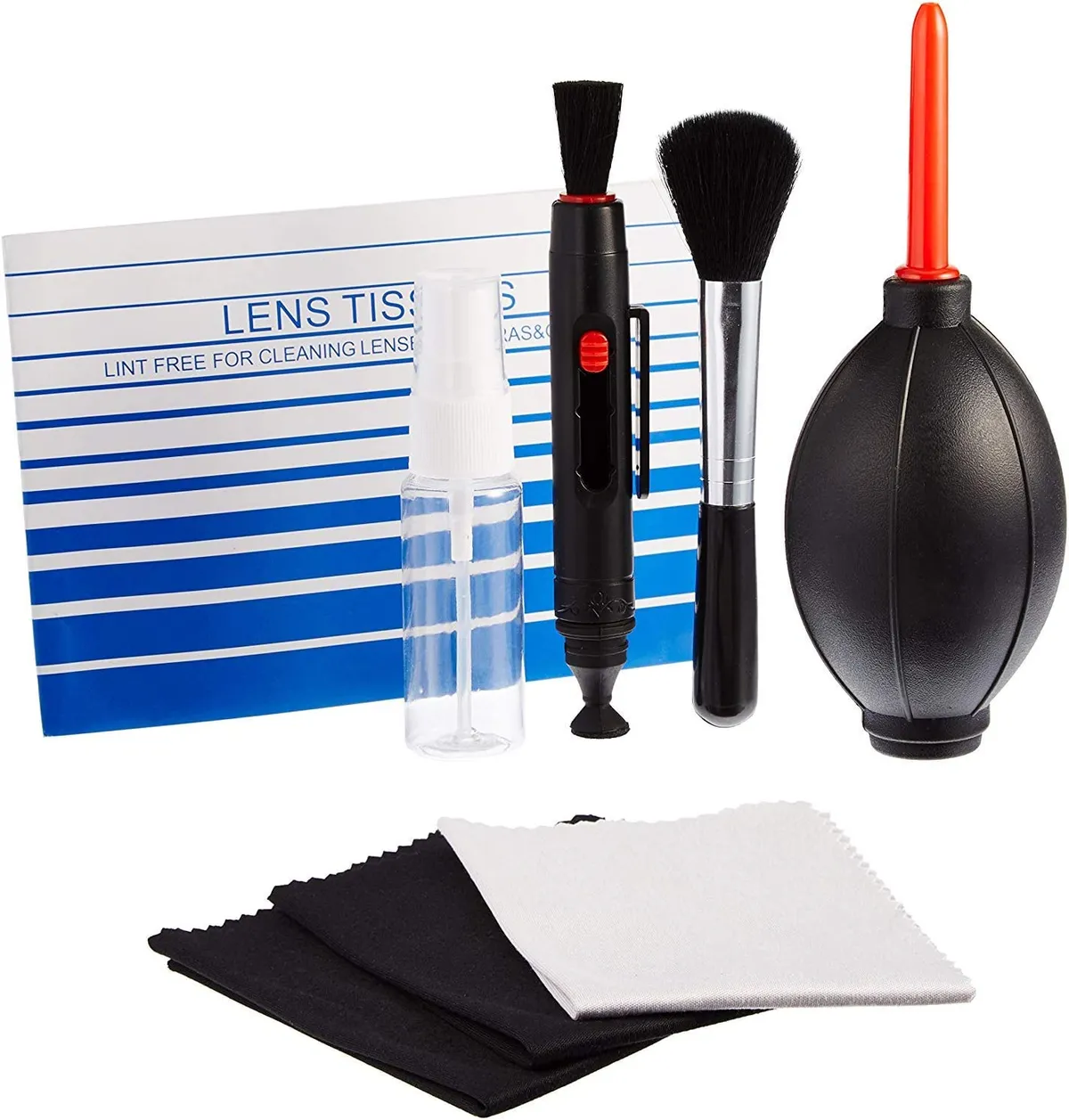Binoculars are a great way for stargazing beginners and expert astronomers alike to navigate around the night sky.
Not only are they considerably cheaper to buy than a telescope, there’s also no need to faff about with needing to align or collimate them, meaning you can get them straight out the box and start observing the night sky.
Binoculars are extremely versatile – if you want to embrace your inner Chris Packham or Bill Oddy during the day, then there are some binoculars that are good for birdwatching and stargazing.
We’ve already put together our list of best binoculars to get you started, but if you want to make your astronomy experience even better there are a range of accessories available to help keep your binoculars clean, let you stargaze comfortably and adapt your binocular set up to any situation.
Here we list our favourite binocular accessories we’ve found on sale today that will enhance every aspect of your stargazing experience.
Best accessories for cleaning binoculars
Amazon Basics lens cleaning kit

One of the best ways to get good views from your binoculars is to ensure that the lenses are free of dust and grime.
However, it’s all too easy to end up scratching the lens’s protective coating or even the glass itself with over enthusiastic cleaning, which is why we suggest you follow our guide on how to clean binoculars to make sure your optics remain in tip top condition.
This kit has all the tools you’ll need to keep your lenses clean and clear – a dust blower bulb, a soft brush, lens cleaning tissues, microfibre cloths, a lens cleaning pen and a spray bottle for lens cleaning fluid (not included, see below).
The same kit can also be used to clean your telescope and clean your DSLR camera sensor.
Ecomoist natural lens cleaner

It’s important to only clean your binoculars using lens cleaning fluid.
Unlike water, it is designed to cut through grease and oil, then evaporate away cleanly so it shouldn't leave any residue or water spots.
Additionally, most binoculars are treated with high performance coatings that minimise the amount of light your lose to reflections that can easily be damaged by other cleaning fluids such as isopropyl alcohol, not to mention you don’t want to use such harsh chemicals on something that will be going near your eyes.
This particular lens cleaner contains no ammonia or alcohol, meaning it is safe to use around pets and children.
You can either buy a small spray bottle, or get a larger refill bottle to reuse one you already have and help cut down on waste.
Celestron LensPen for cleaning optics

- Buy now from Wex Photo Video (£14.00)
For quickly cleaning your binoculars while out and about, this lens pen is the perfect tool.
One end comes with a soft brush to clean away dust, and which retracts into the main body to prevent it getting dirty between uses.
The other end has a rubber tip to help lift off larger dirt.
It’s recommended you clean the LensPen before you use it the first time, though, in case any dust has built up during storage.
Best for using binoculars comfortably
Boosteady binocular harness

Even the keenest of binocular astronomers won't be pointing their binoculars skyward the entire night, which is why most come with a simple neck strap to hold them when not in use (or save them if you accidentally drop them!).
However, the large size and heavy glass lenses of high magnification astronomy binoculars can mean these straps end up putting a lot of strain on your neck, and can start to hurt after several hours of use.
Harnesses such as this one spread the load across your shoulders and hold the binoculars close to your body, preventing them from swinging out and potentially getting damaged, or bouncing around uncomfortably.
There is a slight stretch to the straps, meaning they will give as you move rather than rubbing painfully.
Argos Home metal folding sun lounger

There are many ways to help hold your binoculars steady but taking the load off your feet and sitting down to observe greatly increases the amount of time you can stay out stargazing with binoculars, particularly if you have arthritis or some other issue that makes standing in the cold for hours challenging.
Though there are several specially made observing chairs on the market, these are really designed to position you to look through an eyepiece.
When it comes to binoculars, a classic sun lounger is often the best option, as it lets you recline back, offers head support and a place to brace your elbows if you need them – plus you can use it to relax during the day as well.
This particular model has six reclining positions, allowing you to set the perfect angle to view wherever you need to in the sky, and has a foot rest to keep your leg supported as well.
The chair's ample padding not only keeps you comfortable, but it will help you stay warm during the colder nights.
Alpine Innovations BinoBandit

- Buy now from First Light Optics (£22.00) .
Protecting your eyes from wind and glare while looking through binoculars means you put your eyes through less stress, helping you stay out for longer.
The BinoBandit attaches to the eyepieces of binoculars with objectives of 32mm or larger.
Its flexible neoprene fabric ensuring a comfortable yet snug fit against both the binoculars and your face.
Each side has a buckle, allowing you to attach the two together, so if it starts raining you can clip them together to offer some protection.
Jenor replacement eyepiece guards

Another way to shield your eyes is with these soft rubber replacement eyecups, which have a slanted shape that prevents stray light from coming in the side of your vision.
If you’re a glasses wearer you will probably have to retract any eyepiece cups to prevent them knocking your eyewear, though you may find you can focus your binos so that you don’t need to wear them – just make sure you don’t end up losing your specs in the dark though!
Best for using binoculars with tripods
Praktic universal binocular tripod adapter and mounting

- Buy now from Maplin (£8.99).
One of the great benefits of binoculars is you can hold them with your hands, jumping around the sky from target to target without much trouble.
But the heavy glass lenses can make it difficult to hold binoculars steady for long periods of times, particularly for those with health issues relating to their arms and hands.
The problem only gets worse as you upgrade to higher magnifications, as not only do the larger lenses mean the binoculars are heavier, but the shaking the zoomed in view makes any shaking much more noticable.
As such, you might want to consider using a tripod or mount to hold your binoculars in place while you observe.
You can follow our guide to pick the best mounts and tripods for binoculars, but you'lls need an adapter to attach to your binoculars to them.
You should find most mid to high end binoculars have a screw thread in the bridge (it might have a cover over it) which you can screw devices like adapter into.
Bresser 2-way video head 60mm with extendable swivel arm

While you can just attach your binoculars straight to your tripod, this won’t allow you to position your binoculars to where you want to view the night sky.
A tripod head allows you to easily tip and move your binocular view to get the best views.
Though this particular model is designed for use with video cameras, it does great double use as a binocular mount.
It's long handle allows you move your binoculars with ease through its 360º of horizontal range of motion, or tip it back by up to 90º to point straight up.
Can support up to 8kg of weight and has sliding metal plates help to keep the system balanced, so that your binoculars won’t tip forward on you.
Best other binocular accessories
Vortex Optics Glasspak binocular harness

If you’re hiking up to a dark sky site, you might want to keep your binoculars to hand just in case the perfect conditions arrive.
The harness straps of this binocular bag mean you can carry it on your chest for easy access, and will help spread the weight.
The bag itself is padded, so you’ll be protected from accidental knocks and scrapes as well as the elements, and its bright orange colour make it much easier to find - even when using a red light torch to protect your night vision.
Comes with several mesh side pockets that you can use to hold accessories such as a lens pen, and keep all your binocular gear in one place and arear zipped pocket large enough to hold a mobile phone, though the straps are designed so they could fit underneath a backpack if there’s more you need to carry.
Baader solar filter for binoculars

- Buy now from The Widescreen Centre (from £33.00 each).
While you should never look directly at the unfiltered Sun – especially through the magnified view of binoculars – it is possible to do binocular solar observing if you take proper precautions.
These white light filters are made from Baader Astro Solar film, which cuts out almost all of the Sun’s light, allowing you to view the Sun safely when a pair are attached to your binoculars.
It’s vital you get a good fit so that the filter doesn’t slip or fall off while looking at the Sun, so these come in a variety of sizes to best fit your binoculars.
Each set only comes with one filter, so you’ll need to double up to be safe – you MUST always use a solar filter on each lens before looking at the Sun.
Whenever you use white light solar filters, it's important to check them by holding them up to the light, and seeing if you can see any holes of tears. If you can then they shouldn’t be used anymore.
Dew heaters for binoculars

When out at night, particularly in the damp UK, you can often find dew forms on your telescope or binocularsas water vapour condenses onto the cold glass.
One way to prevent this is with a dew heater, which consists of a heating element you can wrap around the outside of the binocular tube to keep the glass warm.
This particular model is small enough to go around binoculars (or the lens of your DSLR camera if you're also doing astrophotography), and has an inbuilt switch to turn them on and off, and adjust their heat.
You will require one for each lens, and require an external power source via the USB cable which can be plugged into a standard power bank.

